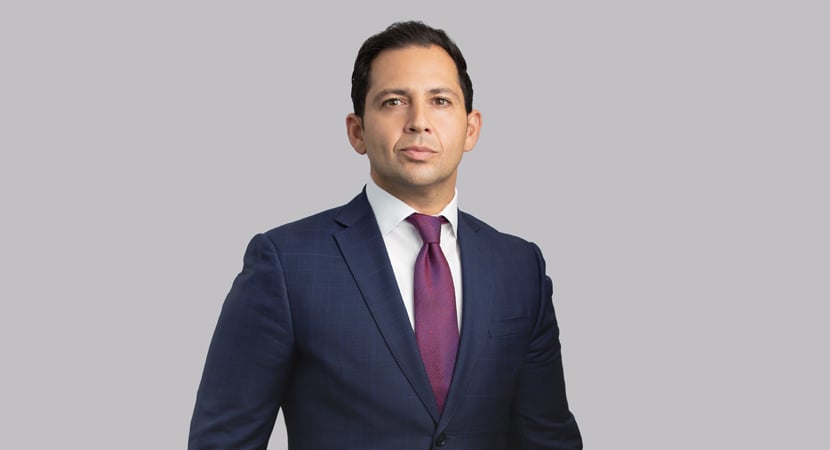The health and wellness industry is poised for explosive growth, and companies looking to innovate in this consumer-driven sector need authoritative and authentic guidance. Loeb & Loeb Co-Chair Arash Khalili kicks off our “Insider Perspective” series on the health and wellness industry with a discussion on Loeb’s Health and Wellness practice and how it brings together a team of lawyers from diverse practices across the firm to provide comprehensive legal guidance on the challenges clients commonly face in this space. From stringent regulatory requirements for both health and advertising claims to corporate transactions, intellectual property matters, and privacy and data security issues, read on to see how Loeb is helping clients stay well positioned in this dynamic market.
Tell us about Loeb’s focus on the health and wellness industry.
Health and wellness are a significant industry sector for many of our practices—sports, media, luxury brands, life sciences, corporate, mergers and acquisitions, technology. We represent food and beverage companies, professional athletes and celebrity influencers, among many others. We have done significant M&A transactions for food and beverage companies and deals for companies in the fitness industry. We also just launched a new health and wellness venture for a top country music star.
Health and wellness isn't just an industry we serve, it’s an essential part of our culture. I’m personally very passionate about health and wellness. I strongly believe—and we as a firm believe—that your health and wellness impact your professional life. The alignment of our passion for health and wellness and the knowledge and experience of our lawyers regarding our clients’ products and services enable us to provide clients with the kind of authoritative and authentic representation they need in this consumer-driven sector.
What is the most common challenge your clients face in the health and wellness sector?
Authenticity—it’s embedded in health and wellness. Consumers want to know that health and wellness providers really believe in their products and services. Authenticity is also critical to successful collaborations between health and wellness brands and celebrity and athlete endorsers. We spend a lot of time counseling brands, celebrities and others to carefully consider the proposed partnership or endorsement relationship.
Given the complex regulatory hurdles that are often associated with the health and wellness sector, what should clients be aware of?
The health and wellness category often incorporates a number of other related legal disciplines, such as data privacy, intellectual property and regulatory compliance, depending on the product or service. I think one of the biggest challenges is being able to substantiate the advertising claims being made.
Influencers have helped supercharge the health and wellness industry by posting on social media platforms such as Instagram and YouTube about health, fitness and beauty routines. But their claims about products have to comply with Federal Trade Commission guidelines on endorser and influencer testimonials.
The U.S. Food and Drug Administration (FDA) also adds an additional, and complex, regulatory layer in terms of both the safety and efficacy of health and wellness products and the advertising claims made by companies and their influencers. Our FDA team members work closely with members of our Corporate and Media and Advertising practices to guide our clients with practical advice on the FDA compliance complexities that impact their business risk management calculations.
This is top of mind for many health and wellness brands that want to capitalize on the influencer-driven market while staying ahead of regulatory developments and remaining compliant.
How is Loeb supporting clients in navigating developments in the health and wellness space?
The intersection of technology and health and wellness presents great opportunities for innovation, but it also brings new challenges as technologies evolve. With artificial intelligence (AI) questions about data privacy, ethical considerations and regulatory compliance become increasingly important. Many technology-based applications in health and wellness, such as wearable devices, rely heavily on vast amounts of data. This raises critical questions: What datasets are these AI models trained on? Are there inherent biases in the data that could impact outcomes? How is consumers’ personal data being securely managed and protected from breaches?
Evolving technology also means that the average consumer has more access to resources and education to be more informed about the products and services they buy. They’re more selective, not just based on quality but on environmental impact, ethics and brand transparency in supply chains. For this reason, brands have to be very careful about their advertising and the claims they make about their products and services.
Our Health & Wellness team understands the complex regulatory landscape and how consumer behavior influences the market. With our holistic approach, we support clients across all sectors of the industry to help develop and present products that are both compliant and competitive.
-
 Co-Chair, Loeb & Loeb LLP
Co-Chair, Loeb & Loeb LLP
)